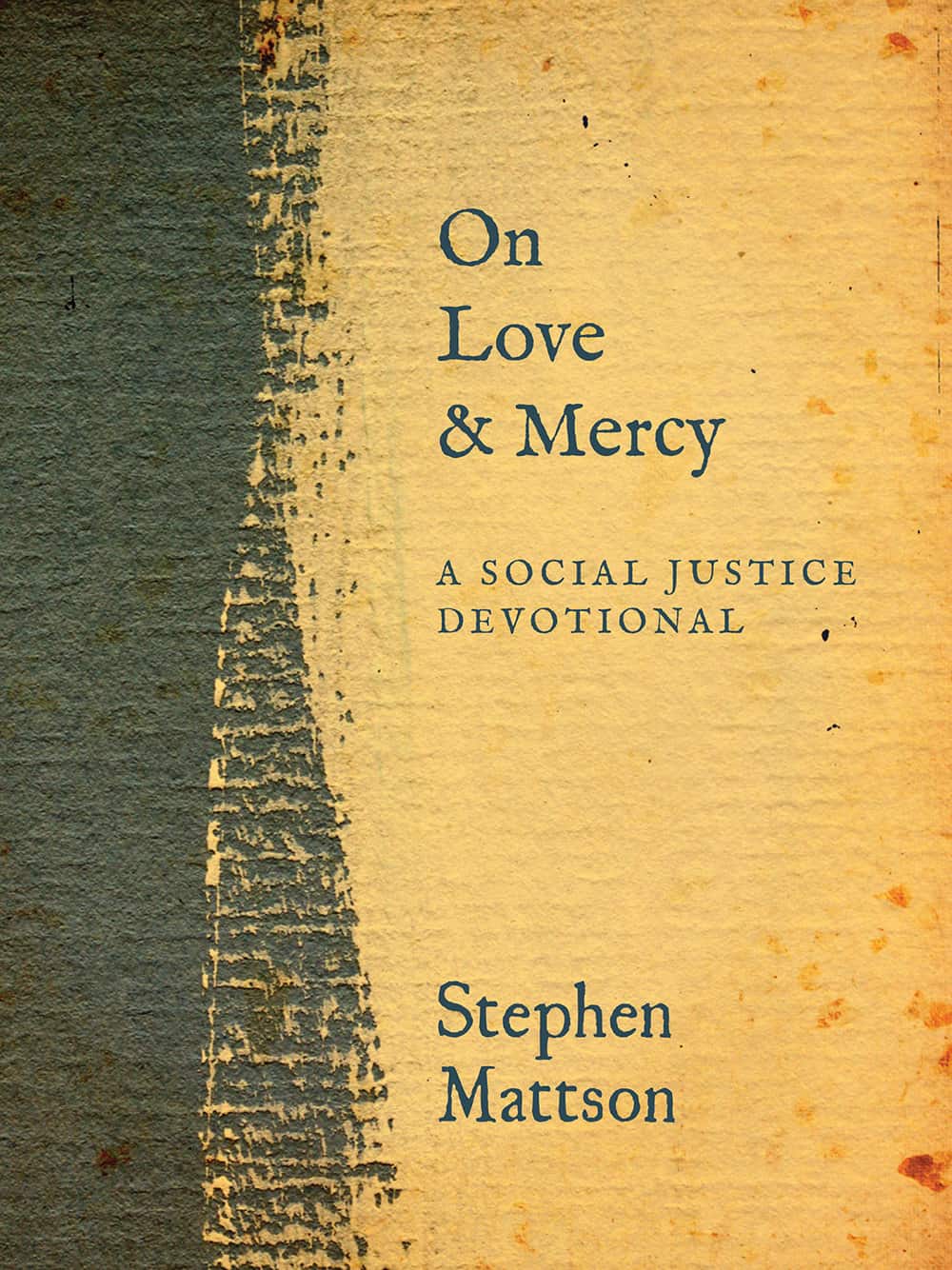 We recently talked with Stephen Mattson, author of the forthcoming devotional On Love and Mercy: A Social Justice Devotional, published by MennoMedia, an imprint of Herald Press. The book is available for pre-order and will be released in November.
We recently talked with Stephen Mattson, author of the forthcoming devotional On Love and Mercy: A Social Justice Devotional, published by MennoMedia, an imprint of Herald Press. The book is available for pre-order and will be released in November.
What led you to write this book?
Through Jesus and his gospel message, God taught me the holiness of justice, and I wanted Christians to also understand this. Recently, there’s been a lot of fearmongering and partisan rhetoric directed towards social justice work, and it’s become something vilified instead of desired. This devotional is my response to witnessing justice work—loving your neighbors— being rejected as a Christian discipline among many within the church.
 You say that social justice is a “godly venture.” Can you explain what you mean by that?
You say that social justice is a “godly venture.” Can you explain what you mean by that?
The work of pursuing justice within society follows the example of Jesus. Social justice played a very important role in the life and ministry of Christ. To do social justice work is to love your neighbor just as Christ did. Social justice is rooted in Christ. It’s been practiced by the church since the life of Christ, it’s part of the Catholic Catechism, and it’s a rich Christian tradition.
You say that “social justice—like Jesus—is inclusive—even to our very worst enemies.” Explain how this kind of mindset and lifestyle can best demonstrate the gospel.
Jesus loves everyone, and so should we. To love others is one of the greatest commandments Jesus gives his followers. Social justice work is one of the best ways to manifest this love, because it focuses on people who are oppressed and maligned by society. One reason people vilify social justice is because they want to vilify the people whom social justice focuses on (i.e. refugees, immigrants, the poor, etc.). By its very nature, social justice work is selfless work that’s committed towards the benefit of others. Social justice is the holy endeavor of loving your neighbors.
You write, “The Bible is…a compilation of texts written by numerous authors who come from diverse social, religious, cultural, economic, and political backgrounds, who use different ancient languages, who write in diverse genres, who implement unique styles, and who communicate to several distinct audiences spanning hundreds of years of history.” Why is diversity important for the church and our work in the world?
God, the Bible, and religion have regularly been co-opted to oppress others, gain power, and commit evil. Scripture even tells us that Satan decided to use the Bible when tempting Jesus, trying to use theology and “biblical” arguments in order to sway Jesus in the desert. Diversity helps hold our faith accountable. Different views, perspectives, and voices act as sources of wisdom and guidance, preventing us from succumbing to the ever-present temptation of narrow-mindedness, singularity, and ignorance.
Jesus shouldn’t be restricted by our own socio-economic, political, cultural, national, and countless other identities. Diversity invites us to see God more fully. Different people, traditions, cultures, perspectives, experiences, narratives, ideas, and testimonies feed our faith. We can either accept them and grow in our love for God and others, or we can deny them and become an echo chamber of our own worst limitations. The gospel is for everyone, revealed to everyone. We can’t truly love others unless we first accept that everyone is made in the divine image of God, passionately loved by God. The imago dei is impossible without celebrating diversity.
In the book you call Jesus a criminal, a heretic, an activist, and more. Why is it important to understand the different facets of Jesus when it comes to engaging in godly social justice?
Because it’s easy to idolize and worship our own opinions above the person of Jesus. Social justice reminds us that everyone is divinely made in the image of God: criminals, heretics, and even the activists we may try to demonize. To reframe Jesus as being a criminal, heretic, and activist—which he technically was during his era—helps remind us to love everyone to the best of our ability, regardless of the status and worth that our society, religion, justice system, or government may place upon them.
While our political, religious, and social groups may devolve into dehumanization, which fuels oppression, social justice work reminds us of the divine humanity of everyone. Social justice, maybe more than any other Christian discipline or tradition, invites us to embrace the divine image of God in others.
Excerpt:
Social Justice is Nonpartisan
Jesus answered, “My kingdom is not of this world.” —JOHN 18:36
For people will be lovers of self, lovers of money, proud, arrogant, abusive, disobedient to their parents, ungrateful, unholy, heartless, unappeasable, slanderous, without self-control, brutal, not loving good, treacherous, reckless, swollen with conceit, lovers of pleasure rather than lovers of God, having the appearance of godliness, but denying its power. Avoid such people. —2 TIMOTHY 3:2-5
SOCIAL JUSTICE is neither liberal nor conservative, neither capitalist nor socialist. No political party, economic system, or form of government has the market cornered on social justice. We may think a democracy is better than a monarchy, or believe a heavily regulated economy is better than a free market, but all of these systems are equally susceptible to being co-opted by bad people or ruled by good ones. Even the most well-intentioned governments and the best political theories can be mismanaged, or broken, and can fail miserably. Every nation in the world has positives and negatives, but perfect utopias don’t exist. Social justice supersedes all political, social, economic, and religious systems.
Nobody holds the exclusive rights to social justice, and social justice is thwarted when interpreted as a partisan agenda, or when it’s only applied to—or exclusively associated with—specific people. Social justice can be done by the young or the old, the rich or the poor. A police officer, an activist, a CEO, a pastor, a teacher, a nurse, a lawyer, a politician, a parent, a social worker, a waitress, or a child; anyone can practice social justice. Social justice struggles when restricted by our own boundaries, and it must reflect the equity and fairness of God, not the skewed lines we use to segment groups and label people. Social justice work asks us to be impartial to our own preferred—yet imperfect—religious, political, and ideological beliefs. Social justice cannot be understood or pursued solely through the prism of our own biases, and its divine nature makes it a communal and holy ideal, something that cannot be owned or controlled by any one person, group, ideology, or partisan agenda.
It can be hard, but we are invited by God to humbly accept that our own religious communities, political parties, economic policies, government systems, and social structures are capable of injustice. Nobody is blameless—not even ourselves—so let’s pray that our work is consistent in our pursuit so that when we encounter injustice we will be able to bring love, mercy, and justice to others, especially when it’s needed within our very own country, political party, church, or family.
The pursuit of justice challenges us to have no double standards or ulterior motives. It shouldn’t be used to harm the reputation of our enemies, or score political points for our favorite candidate, or spread a partisan agenda. Social justice work is a sacred responsibility, and we must be equally passionate about ending oppression whether we find the culprit of injustice to be a friend or foe. This is why pursuing social justice is easier for us when rooted in the love of Christ, because through the power of the Holy Spirit the miracle and mystery of love can be achieved.
MEDITATION
When are we most susceptible to bias, or to showing unfair preference for our particular beliefs or identity? How does politics help or hinder the work of social justice?
My brothers and sisters, believers in our glorious Lord Jesus Christ must not show favoritism. —JAMES 2:1 NIV
For God shows no partiality. —ROMANS 2:11
Finally, brothers and sisters, whatever is true, whatever is noble, whatever is right, whatever is pure, whatever is lovely, whatever is admirable—if anything is excellent or praiseworthy—think about such things. Whatever you have learned or received or heard from me, or seen in me—put it into practice. And the God of peace will be with you. —PHILIPPIANS 4:8-9 NIV
PRAYER
Dear God, may my pursuit for justice be honorable, pure, lovely, commendable, and just. May my thoughts, words, and actions be worthy of praise and truthful. Jesus, lead me through the powerful example of your life and words, and may the Holy Spirit guide me.
Excerpted from On Love and Mercy: A Social Justice Devotional by Stephen Mattson. ©2021 Herald Press. Used with permission. www.heraldpress.com.


